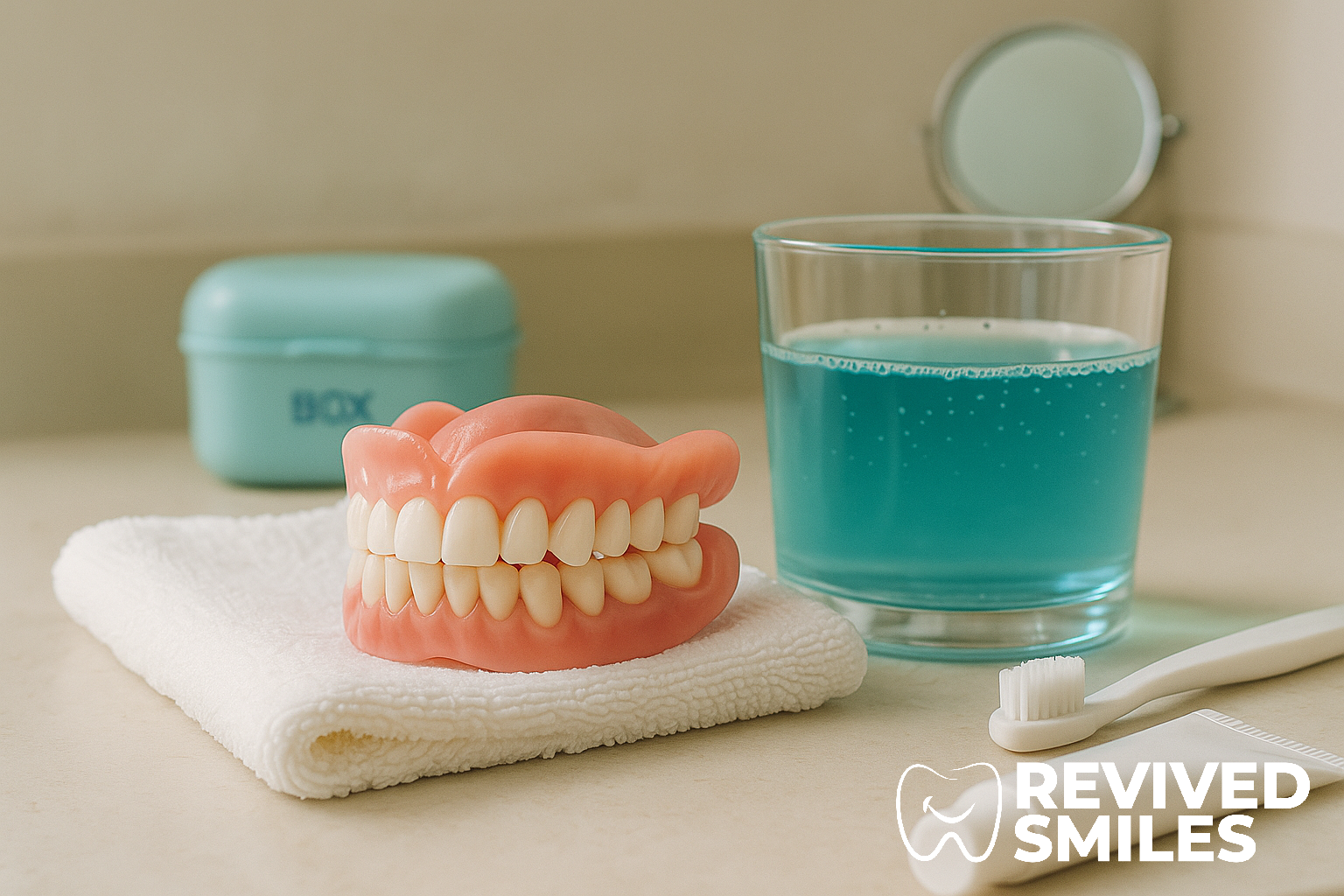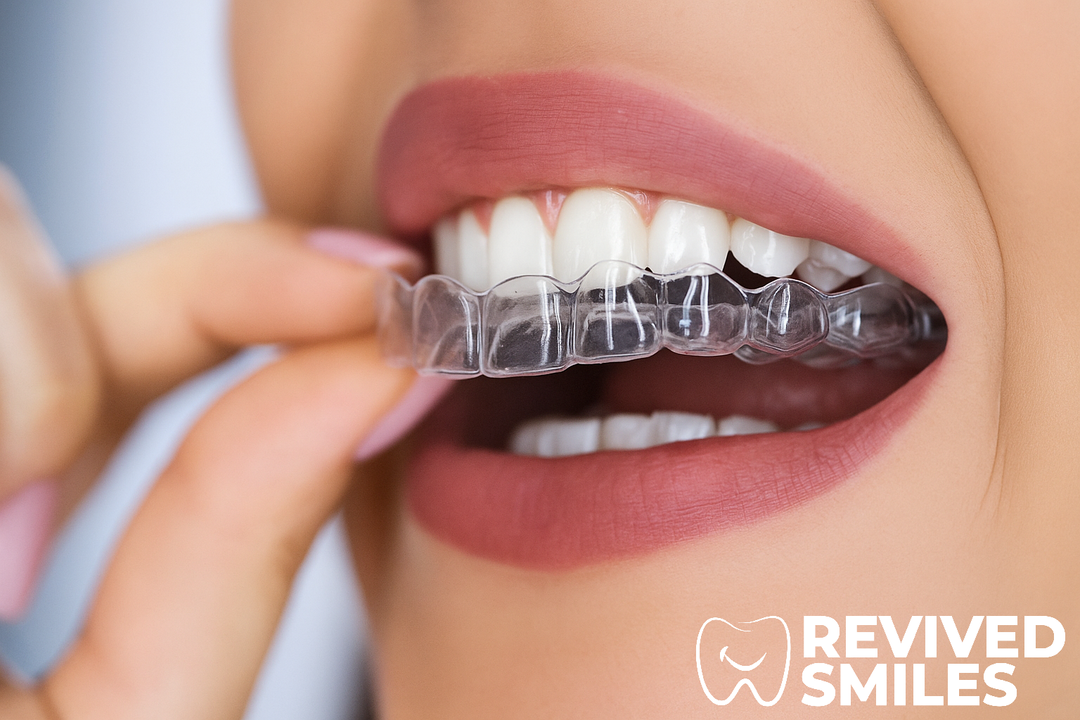¿Cuánto duran las dentaduras postizas completas? Duración, consejos de cuidado y cuándo reemplazarlas

Un nuevo juego de dentaduras postizas completas puede sentirse como un nuevo comienzo, por lo que es vital entender cuánto duran realmente estas nuevas dentaduras postizas.
Comprender la vida útil de las prótesis dentales completas no solo es interesante, sino esencial. Nos ayuda a planificar con antelación, evitar sorpresas desagradables y asegurar que cada sonrisa se mantenga firme, segura y llena de confianza.
En Revived Smiles , saber qué esperar permite una mejor salud bucal y una experiencia más fácil y cómoda.
Exploremos todo lo que necesita saber sobre cuánto duran las dentaduras postizas completas, cómo cuidarlas y cómo reconocer cuándo es el momento de reemplazarlas.
Por qué es importante la longevidad de las dentaduras postizas
Piensa en tus zapatos favoritos. Un día te quedan perfectos, y de repente se resbalan o te resultan incómodos. Con las dentaduras postizas puede pasar lo mismo.
Las dentaduras postizas completas son un gran compromiso, especialmente para aquellos con dientes faltantes. Dientes . Saber cuánto duran normalmente y qué puede acortar su vida útil nos ayuda a evitar molestias, a comer y hablar con facilidad, y a prevenir problemas inesperados. Y lo que es más importante, nos ayuda a mantener la confianza en nuestra vida diaria.
La educación y la participación del paciente son esenciales para mantener la longevidad de las dentaduras postizas, ya que los pacientes informados están mejor equipados para cuidar sus dentaduras postizas y reconocen cuándo se necesita ayuda profesional.
En pocas palabras, Las dentaduras postizas duraderas no son solo cuestión de comodidad. Son sinónimo de salud, tranquilidad y bienestar.
¿Cuál es la vida útil promedio de las dentaduras postizas completas?
La mayoría de las dentaduras postizas completas duran entre cinco y diez años.
Puede que te sorprenda que la tuya parezca seguir funcionando bien después de varios años. Pero incluso las prótesis dentales completas de alta calidad se desgastan con el tiempo, como cualquier herramienta que usamos a diario. Masticar ejerce presión sobre el material, la mandíbula se mueve naturalmente y la boca cambia de forma.
Con el tiempo, todo esto hace que las dentaduras postizas ya no se ajusten como antes. Reemplazarlas antes de que causen problemas es una decisión inteligente.
Una reciente revisión sistemática y metaanálisis de estudios clínicos confirma que la vida útil típica de las dentaduras postizas completas se encuentra dentro de este rango de cinco a diez años.
¿Qué afecta la duración de las dentaduras postizas?
Muchos factores, incluidos los implantes dentales, pueden afectar la duración de la prótesis dental. El criterio profesional es fundamental al evaluar los factores que influyen en la duración de la prótesis en cada caso.
Calidad del material
Los materiales de mejor calidad tienden a durar más. El acrílico, la porcelana, los plásticos e incluso algunos componentes metálicos o plásticos de alta calidad pueden contribuir a una dentadura postiza más duradera.
Hábitos diarios
¿Masticas hielo? ¿Rechinas los dientes? ¿Se te cae la dentadura postiza en el lavabo? Hábitos como estos pueden acortar su vida útil. Al igual que los dientes naturales, las dentaduras postizas se benefician de un manejo cuidadoso.
Salud bucal
Los cambios en el tejido gingival, el hueso o la salud bucal en general influyen significativamente en la longevidad de las prótesis dentales. La pérdida ósea, la pérdida de dientes o la remodelación de la mandíbula superior o inferior pueden provocar que las prótesis se aflojen o resulten incómodas, incluso si la estructura aún se encuentra en buen estado.
Rutina de mantenimiento
El cuidado de sus dentaduras postizas es importante. Límpielas a diario con un limpiador adecuado, no con pasta de dientes, para evitar rayones. Enjuáguelas siempre después de las comidas, guárdelas adecuadamente y nunca las sumerja en agua caliente o hirviendo.
Para obtener mejores resultados, siga siempre las instrucciones del fabricante para limpiar y mantener sus dentaduras postizas.
Tipos de dentaduras postizas completas y cuánto duran
Hay varios Opciones de dentaduras postizas disponibles, incluidas dentaduras postizas parciales, cada una de las cuales ofrece diferentes duraciones de vida y beneficios según el tipo, los materiales y los métodos de retención utilizados.
No todas las dentaduras postizas son iguales y su vida útil esperada depende de su diseño y de cómo se utilizan.
Prótesis dentales completas convencionales
Se fabrican después de que las encías hayan cicatrizado completamente tras las extracciones. Suelen durar de cinco a diez años y ofrecen un ajuste más estable y cómodo para la cavidad bucal .
Prótesis dentales completas inmediatas
Se colocan inmediatamente después de la extracción del diente y son una solución rápida, pero generalmente necesitan ajustes o un reemplazo completo antes, a menudo dentro de los tres a cinco años.
Prótesis dentales completas soportadas por implantes
Con el apoyo de implantes dentales, este tipo de prótesis puede durar de diez a veinte años o más. Ofrecen una gran estabilidad, ayudan a prevenir la pérdida ósea y se consideran una de las mejores opciones para un uso prolongado.
En comparación con otras prótesis removibles, las dentaduras soportadas por implantes generalmente brindan una estabilidad y longevidad superiores, lo que las convierte en la opción preferida para muchos pacientes edéntulos.
Entonces, si está pensando en la opción más duradera y con sensación más natural, las dentaduras postizas soportadas por implantes pueden ser una inversión que valga la pena.
Factores especiales que afectan la longevidad de las dentaduras postizas

Mientras que el cuidado diario, incluido el adecuado Si bien la limpieza de las dentaduras postizas y los controles regulares son esenciales, existen algunos factores especiales que pueden influir en la duración de sus dentaduras postizas, a veces de maneras que no espera.
Desde cambios en su mandíbula hasta accidentes inesperados, comprender estos factores puede ayudarle a proteger sus dentaduras postizas y mantener su salud bucal en los años venideros.
Remodelación ósea y cómo afecta a sus dentaduras postizas
La mandíbula no es estática, cambia constantemente a través de un proceso llamado remodelación ósea. A medida que envejecemos o después de la pérdida de dientes, la mandíbula puede encogerse o remodelarse, lo que puede afectar la forma en que... Las dentaduras postizas encajan .
Esto es especialmente importante para quienes usan prótesis dentales sobre implantes, ya que los cambios en el hueso pueden hacer que los implantes se aflojen o causar molestias al comer. Si nota que su prótesis no le queda tan bien como antes o experimenta molestias, podría ser el momento de una revisión. Rebasado o incluso reemplazo de prótesis dentales. Las visitas regulares al dentista son fundamentales, ya que pueden supervisar sus implantes y prótesis, recomendar ajustes y garantizar que su sonrisa se mantenga cómoda y segura.
Accidentes y daños en las dentaduras postizas: qué tener en cuenta
Incluso con el mejor cuidado, pueden ocurrir accidentes. Dejar caer su dentadura postiza, especialmente sobre una superficie dura, puede provocar astillas, grietas o incluso una rotura total. Para ayudar a prevenir daños, manipule siempre su dentaduras postizas sobre una toalla suave o un lavabo lleno de agua.
Para la limpieza, evite usar agua caliente o hirviendo, ya que las temperaturas extremas pueden deformar los materiales y afectar el ajuste. Utilice métodos de limpieza suaves, un cepillo de cerdas suaves y jabón neutro, y evite productos químicos agresivos o materiales abrasivos. Si su dentadura postiza está dañada, no intente repararla usted mismo.
Comuníquese con su dentista de inmediato para que pueda evaluar la situación y recomendar la mejor solución, ya sea una reparación, un rebase de la dentadura o un reemplazo completo.
Fluctuaciones de peso y cambios en el ajuste de la dentadura postiza
Los cambios significativos de peso pueden afectar no solo tu vestuario, sino también el ajuste de tu dentadura postiza. Al subir o bajar de peso, la forma y el volumen de tus tejidos bucales pueden cambiar, lo que a veces hace que tu dentadura postiza se sienta floja o incómoda.
Si nota que su dentadura postiza se resbala , le causa molestias o le dificulta comer, es importante que consulte a su dentista. Podría sugerirle un rebase para ajustar el ajuste, lo que le ayudará a evitar el dolor y a mantener su dentadura postiza funcionando correctamente.
Mantenerse alerta a los cambios en cómo se sienten sus dentaduras postizas es una manera sencilla de proteger su comodidad y salud bucal.
Consideraciones sobre la mandíbula inferior: ¿Por qué la dentadura inferior es complicada?
Muchos usuarios de prótesis dentales descubren que la mandíbula inferior presenta desafíos únicos. Tras la pérdida de una pieza dental, la mandíbula tiende a perder hueso más rápido que la superior, lo que puede provocar que las prótesis completas en la parte inferior se sientan flojas o inestables. Este es un problema común, pero existen soluciones.
Su dentista podría recomendarle prótesis dentales sobre implantes para mayor estabilidad o un rebase para mejorar el ajuste. Las revisiones periódicas son especialmente importantes para las prótesis inferiores, ya que su dentista puede detectar signos tempranos de mal ajuste y sugerir el tratamiento adecuado para mantener la mandíbula sana y la prótesis segura.
Recuerde que el cuidado adecuado, que incluye la limpieza diaria con limpiadores para dentaduras postizas, evitar el agua caliente o hirviendo y un almacenamiento seguro, ayudará a prolongar la vida útil de sus dentaduras postizas y a mantener su sonrisa saludable.
Al conocer estos factores especiales y colaborar estrechamente con su dentista, podrá disfrutar de prótesis dentales cómodas y funcionales durante muchos años. El mantenimiento regular, el cuidado adecuado y los ajustes oportunos son la clave para una sonrisa sana y segura, independientemente de las circunstancias.
Cuándo es el momento de reemplazar su dentadura postiza
Las dentaduras postizas pueden no tener fecha de vencimiento, pero tu boca te dará pistas cuando algo no anda bien.
Busque señales como:
-
Las dentaduras postizas se sienten flojas o se mueven mientras habla o come
-
Dolor, irritación en las encías o llagas en la boca.
-
Grietas o desgaste en los dientes de la dentadura postiza
-
Dificultad para masticar ciertos alimentos
-
Cambios en la apariencia facial o en la forma en que se ajusta la dentadura postiza
-
Olores persistentes o problemas con la limpieza de la dentadura postiza
Estos síntomas podrían indicar que su dentadura postiza necesita un rebasado, un ajuste o un reemplazo completo. Un dentista puede ayudarle a decidir qué es lo mejor según las pautas actuales basadas en la evidencia.
Consejos sencillos para que las dentaduras postizas duren más
La limpieza regular de las dentaduras postizas es esencial para mantener su longevidad y prevenir problemas de salud bucal.
No puedes detener el tiempo, pero puedes tomar medidas para ayudar a que tus dentaduras postizas duren el mayor tiempo posible.
Limpiar todos los días
Use un cepillo de cerdas suaves y un limpiador adecuado para dentaduras postizas , asegurándose de acceder a todas las áreas de la dentadura durante la limpieza para eliminar completamente los residuos. Evite la pasta de dientes, que es demasiado abrasiva, y enjuáguela siempre después de las comidas. Déjela en remojo durante la noche para ayudar a mantener su forma.
Sé amable
Las dentaduras postizas pueden romperse si se caen. Límpielas siempre con una toalla o un lavabo lleno de agua, por si acaso.
Evite los alimentos problemáticos
Los caramelos duros, el caramelo pegajoso e incluso los bolígrafos masticables pueden dañar gravemente los dientes postizos. Consuma alimentos que no dañen su prótesis.
Utilice el adhesivo para dentaduras postizas con prudencia
Una pequeña cantidad de adhesivo para dentaduras postizas puede ayudar a mejorar el ajuste y reducir las molestias. Solo asegúrese de usarlo según las indicaciones y no como... Solución para dentaduras postizas mal ajustadas .
Mantenlos húmedos
Dejar que la dentadura postiza se seque puede deformarla. Guárdela en agua o solución para dentaduras postizas cuando no la tenga en la boca.
Hágase chequeos regulares
Las revisiones regulares con el dentista son esenciales para mantener el ajuste y la función de la dentadura postiza. Visite a su dentista al menos una vez al año. Revisará el ajuste, recomendará un rebase si es necesario y buscará signos de desgaste u otros problemas.
Prestar atención
Los pacientes deben ser proactivos al notar cualquier dolor, acumulación de placa o cambios en la sensación de sus dentaduras postizas. No espere, detectar los problemas a tiempo marca una gran diferencia.
Cuándo visitar al dentista
Algunos problemas con las dentaduras postizas son evidentes. Otros son más sutiles.
Asegúrese de programar una visita con su dentista si:
-
Sientes alguna molestia o dolor
-
Sus dentaduras postizas se han aflojado
-
Hablar con claridad se ha vuelto más difícil
-
No te has hecho un chequeo en más de un año
Su dentista puede ayudarle a decidir si necesita un rebase, una reparación o una restauración completa. Reemplazo de prótesis dental . También pueden explicarle sus opciones, ya sean prótesis nuevas, prótesis parciales, puentes dentales o prótesis sobre implantes. Si aún conserva dientes, su dentista puede ayudarle a decidir entre prótesis parciales, puentes dentales u otras opciones.
Conclusión: Un poco de cuidado ayuda mucho
Las dentaduras postizas pueden durar mucho tiempo, pero requieren atención. Cuidarlas significa menos molestias, menos problemas y sonrisas más seguras.
Ya sea que use dentaduras postizas removibles tradicionales o esté explorando opciones soportadas por implantes, saber cuánto duran las dentaduras postizas completas y cómo detectar los signos de desgaste lo ayuda a mantenerse a la vanguardia.
Según las recomendaciones del Colegio Americano de Dentistas, seguir las pautas profesionales para el cuidado de las dentaduras postizas y reemplazarlas en intervalos apropiados es importante para mantener la salud bucal.
En Revived Smiles, estamos aquí para apoyar su sonrisa con atención experta, opciones de alta calidad y consejos útiles en los que puede confiar.
Preguntas frecuentes
¿Cuánto tiempo se pueden usar las dentaduras postizas completas cada día?
La mayoría de las personas usan su dentadura postiza durante el día y se la quitan por la noche. Esto permite que las encías y los tejidos bucales descansen y se mantenga todo limpio.
¿Pueden las dentaduras postizas completas durar toda la vida?
Generalmente no. Incluso con buenos hábitos, la boca cambia con el tiempo y la mayoría de las dentaduras postizas deben reemplazarse después de cinco a diez años.
¿Cuáles son las señales de que es necesario reemplazar las dentaduras postizas?
Si están flojos, incómodos, dañados o afectan su forma de comer o hablar, probablemente sea momento de consultar a su dentista.
¿Cómo se comparan en términos de vida útil las dentaduras postizas soportadas por implantes?
Suelen durar más, a menudo hasta veinte años o más. Además, son más seguros y ayudan a reducir la pérdida ósea.
¿Las dentaduras postizas se desgastan más rápido sin el cuidado adecuado?
Sí. Un mantenimiento deficiente puede provocar roturas prematuras, manchas y molestias. Mantenga una rutina de limpieza rigurosa y siga los consejos de su dentista.
¿Existen materiales más duraderos para las dentaduras postizas?
Sí. Los dientes de porcelana y las bases reforzadas con metal ofrecen mayor durabilidad y mejor función. Su dentista puede recomendarle la mejor opción para sus necesidades.
Si busca comodidad, confianza y valor, nuestra Las colecciones de dentaduras postizas completas y parciales ofrecen soluciones confiables para reemplazar dientes faltantes, todo respaldado por apoyo y atención de expertos.





Dejar un comentario